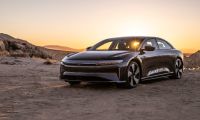The new electric vehicle federal tax incentive is only available to a select portion of Americans old enough to buy a car. Based on our research, we have found that less than half of those who file taxes can take advantage of the new federal tax incentive, supposedly intended to make EVs more affordable and encourage green vehicle purchases.
The federal income tax incentive allows an EV buyer to deduct up to $7,500 from the tax they owe to the federal government. Do not confuse this with how much they owe after filing their taxes to make up for incomplete payments. The reduction in taxes is based on all dollars due to federal income taxes. In other words, if you paid $7,500 to the federal government in taxes from your paycheck in the year you bought a qualifying car, that money would be returned to you. However, if you don't actually pay any taxes in a given year, you cannot expect a refund. Since you didn’t pay any taxes. Make sense so far? The way the law is designed, about four out of ten American households are afforded zero benefits from the EV tax incentive law because they paid zero in federal income tax. They may as well buy a gasser or a hybrid.
So who are these “undesirables” the 117th Congress and President Biden felt were undeserving of help buying an EV? According to Statista, 40.1% of American households paid no federal income taxes in 2022. Included in the earnings groupings that paid no federal income taxes were households with earnings between $100,000 and $200,000. Fully 15% of households with earnings as high as $75,000 paid no federal income taxes. Of course, these statistics are only applicable to the households who actually filed a federal income tax return. Some don’t bother.
As much as Congress and President Biden felt the need to exclude the Americans at the low end of the earnings curve, they felt an even greater need to exclude the much-despised hardest-working and most successful working Americans. These workers are, ironically, the most likely to be able to afford a new EV, which now averages over $66,000, according to KBB. The law has specific exclusions for those individuals who earn a taxable income of $150,000 or more and married couples who are filing jointly who earned $300,000 or more in combination. This cuts out people like State Troopers, medical professionals, and many other professions. The basic message is, “success, like failure, must be discouraged.”
How many American households earn over $300,000? According to one source, about 4.3% of households earn over $300,000. We think it is a safe assumption that many of these households, if not most, are made up of couples filing jointly.
There is one more exclusion. If you are the person responsible for a household, called "Head of Household" by the tax enforcers, you are excluded if you earn more than $225,000. Why? Our best guess is that Congress and President Biden don't want responsible people to buy EVs.
So we know that roughly 44.4% of households have earnings that put the household members out of consideration for an EV tax incentive. So how did we conclude that “more than half of all American workers are excluded?” Simply because in every tax bracket, double-digit percentages of those who pay taxes file “Joint” tax returns. That means that the households we discussed above are made up of multiple individuals.
Social media is full of posts discussing which EVs do and don’t qualify for an EV tax incentive. What the posts should be talking about is why more than half of us are not even allowed into the conversation.
Top of page image by John Goreham.
John Goreham is a long-time New England Motor Press Association member and recovering engineer. John's interest in EVs goes back to 1990 when he designed the thermal control system for an EV battery as part of an academic team. After earning his mechanical engineering degree, John completed a marketing program at Northeastern University and worked with automotive component manufacturers, in the semiconductor industry, and in biotech. In addition to Torque News, John's work has appeared in print in dozens of American news outlets and he provides reviews to many vehicle shopping sites. You can follow John on TikTok @ToknCars, on Twitter, and view his credentials at Linkedin
Re-Publication. If you wish to re-use this content, please contact Torque News for terms and conditions.
Set Torque News as Preferred Source on Google












Comments
Best bet is to lease and get
Permalink
Best bet is to lease and get the $7500 taken off the lease...if this is actually the law...this week, or wait until the $7500 is a credit on the purchase price, a definite maybe.